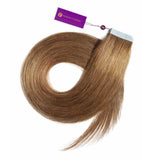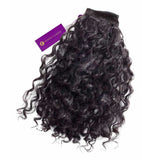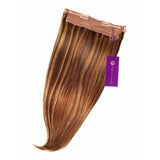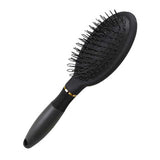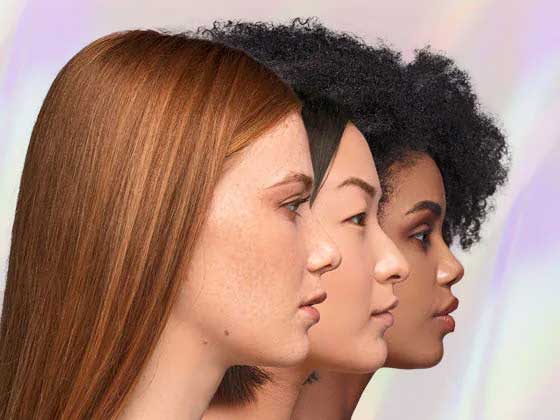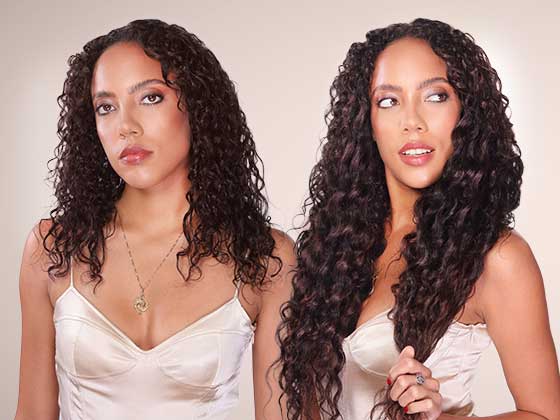Summertime brings with it long days, warm breezes, and endless opportunities for outdoor fun. However, while we soak up the sun's rays, basking in its warmth, we often forget that our hair is also at risk. Just as prolonged sun exposure can damage our skin and cause sunburns, it can also wreak havoc on our precious locks. Needless to say, neglecting to protect our hair from the sun's harmful rays can lead to dryness, frizz, brittleness, and even discoloration.

What Are the Effects of the Sun on Your Hair?
While we often associate the sun's impact with our skin, it's important to recognize the significant effects it can have on our hair as well. Prolonged sun exposure can lead to various signs of sun-damaged hair, indicating that our locks need some extra care and protection. Here are a few common signs to watch out for:
- Dryness - The sun's rays can deplete the moisture content in our hair, leaving it dry, brittle, and prone to breakage. Dry hair lacks elasticity and shine, giving it a dull and lifeless appearance.
- Fading color - If you've noticed your hair color losing its vibrancy and becoming dull, the sun may be to blame. UV rays can oxidize the hair's pigment, causing color fading and making it appear lackluster.
- Frizz and tangles - Sun-damaged hair often becomes frizzy, unruly, and prone to tangles. The sun's heat can strip the hair of its natural oils, leading to cuticle damage and resulting in frizz and difficulty in managing your locks.
- Split ends - Exposure to the sun can weaken the hair shaft, leading to split ends. Split ends not only make your hair look unhealthy but can also hinder its growth and overall appearance.
- Discoloration - If you have color-treated hair, the sun can cause your color to change or become brassy. Blondes may notice their hair taking on a yellowish hue, while brunettes might experience reddish or orange tones.
- Weakened hair structure - UV rays can penetrate the hair shaft, breaking down proteins and weakening its structure. This can lead to hair that feels thin, fragile, and more prone to damage.
Here’s How to Protect Your Hair from Sun Damage During Summer
As the summer sun shines its brightest, it's crucial to remember that our hair needs protection just as much as our skin does. By taking proactive measures, we can shield our hair from the damaging effects of UV rays, ensuring that it remains healthy, vibrant, and full of life. Here are some measures to keep your hair safe from the sun’s harmful rays:
Avoid coloring your hair
It is recommended to avoid coloring your hair before taking necessary steps to protect it from the sun. Sun exposure can increase hair sensitivity and potentially lead to faster color fading or distortion, especially if you've recently dyed your hair. In addition, UV rays can cause unintended color changes and damage the hair shaft.
Avoid shampooing every day
While keeping your hair clean is important, shampooing your hair every day may not be the best approach, especially during the summer months. Overshampooing can strip away natural oils, leading to dryness and damage. By reducing the frequency of shampooing, you allow your hair to retain its natural moisture, preserve the color for longer, and hold styles better.
Don’t forget to use shampoo after swimming
After swimming in pools or the ocean, it is crucial to remember to use shampoo to cleanse your hair. Chlorine and salt water can cause dryness, damage, and color fading if not addressed. Shampooing after swimming helps remove these harmful elements, maintain scalp health, restore moisture, and prevent product build-up. It is especially important for color-treated hair to prevent color dullness.
Minimize heat exposure from hair tools
Protect your hair from heat damage by minimizing the use of styling tools like blow dryers, curling irons, and straighteners. Also, you add more protection by using heat protectants before styling and exploring heat-free styling methods to give your hair a break from high temperatures.
Protect your colored hair
To ensure the longevity and vibrancy of your colored hair, it is essential to take proper care of it. This involves using color-safe products, minimizing the frequency of washes, protecting your hair from sun exposure, avoiding excessive heat styling, regularly deep conditioning, and scheduling touch-ups with your hairstylist. By following these guidelines, you can maintain your colored hair's health, shine, and stunning appearance for an extended period.
Use sun protection
Using sun protection for your hair is essential to prevent color fading, maintain hair health, prevent dryness and frizz, shield your scalp, and choose the right products designed to provide UV protection. Applying sun protection products or wearing hats with UPF can help preserve your hair's color, moisture, and overall health while reducing the risk of sunburn and irritation.
Use the right conditioner for your hair type
Using the right conditioner for your hair type is crucial in protecting your hair from sun damage. It ensures that your hair receives the appropriate level of hydration, provides a shield against UV radiation, and offers additional benefits like improved manageability and styling performance. Moreover, they repair and strengthen the hair while addressing specific needs, such as dryness, oiliness, or damage.
Does Using Hair Sunscreen Work Well to Stop Hair Damage?
Hair sunscreen products are specifically formulated to shield your hair from the damaging effects of UV rays. These products are formulated with ingredients like UV filters, antioxidants, or natural extracts that work together to create a protective barrier on your hair strands, preventing UV radiation from penetrating and causing harm.
Hair sunscreen is highly effective in providing an additional layer of defense against the sun's rays. The UV filters in these products act as a shield, blocking and absorbing the harmful UV radiation that can lead to color fading, dryness, and damage to the hair cuticles. Antioxidants and natural extracts help to neutralize free radicals generated by UV exposure, reducing oxidative stress and protecting the hair from environmental damage.
However, it's important to understand the limitations of hair sunscreen. Just like with skin sunscreen, it is necessary to reapply hair sunscreen regularly, especially after swimming or sweating, to maintain its effectiveness. Remember that hair sunscreen, like any hair product, can also build up over time. To prevent product buildup, it's recommended to use clarifying shampoos occasionally to remove any residue and restore the hair's natural balance.
Show Some Love To Your Hair During Summer
During the summer, it's crucial to show some love to your hair and take preventive measures to protect it from sun damage. These include using hair sunscreen products, opting for the right conditioner for your hair type, avoiding daily shampooing, using shampoo after swimming, minimizing heat exposure from styling tools, and taking care of your colored hair.
Doing these is essential because they help maintain hair health and prevent issues like color fading, dryness, frizz, and overall damage caused by sun exposure. By investing time and effort into hair protection during summer, you can enjoy long-term benefits, including vibrant and healthy hair.
Remember that everyone's hair is unique, and what works for one person may vary for another. This is why we encourage you to experiment and find the strategies that work best for your hair type, lifestyle, and preferences. Prevention is key, and by proactively protecting your hair, you can ensure its health and appearance remain at their best throughout the summer season and beyond.
How does it work?
Hair sunscreen works by creating a protective barrier on the hair strands using ingredients like UV filters, antioxidants, and natural extracts. UV filters absorb or reflect UV rays to prevent them from penetrating the hair shaft and causing damage. Antioxidants help neutralize free radicals generated by UV exposure, protecting the hair from oxidative stress. Natural extracts provide additional benefits and nourishment to the hair. Hair sunscreen acts as a shield, reducing color fading, dryness, and damage caused by UV radiation.
Can I use hair sunscreen on my scalp?
Yes, you can use hair sunscreen on your scalp. While hair sunscreen is primarily designed to protect the hair strands, it can also be applied to the scalp to provide some level of sun protection. The scalp is often exposed to direct sunlight, especially if you have thin hair, a receding hairline, or if you're wearing hairstyles that expose the scalp.
When applying hair sunscreen to the scalp, it's important to part your hair and evenly distribute the product along the exposed areas of the scalp. Gently massage the sunscreen into the scalp to ensure thorough coverage. Keep in mind that hair sunscreen may feel slightly different when applied to the scalp compared to the hair strands, but this is normal.
Using hair sunscreen on the scalp can help protect sensitive skin from sunburn, UV damage, and potential long-term effects of sun exposure. It's especially important if you spend extended periods of time outdoors or if you're in a sunny environment.
However, if you prefer a dedicated scalp sunscreen product, you can explore options specifically formulated for scalp protection. These products often come in spray or powder form and are designed to provide targeted sun protection for the scalp.
Hair Extensions: A Sun-Safe Styling Solution
While enjoying the sunny days of summer, you might be tempted to add some extra flair to your hairstyle with hair extensions. Whether you desire longer locks, voluminous waves, or colorful highlights, hair extensions can instantly transform your look. However, just like your natural hair, they require protection from the damaging effects of the sun.
Choose Quality Extensions: Investing in high-quality hair extensions is crucial for their longevity and resistance to sun damage. Synthetic hair extensions, while more affordable, may not withstand the sun's UV rays as well as human hair extensions. Human hair extensions, especially those made from Remy hair, tend to be more resilient and can be treated like your natural hair.
Apply Leave-In Conditioner: Before heading out into the sun, apply a leave-in conditioner to your hair extensions. This will help maintain their moisture levels and create a protective barrier against UV rays. Look for leave-in conditioners that contain UV filters to provide an extra layer of protection.
Wear a Hat or Scarf: One of the most effective ways to shield your hair extensions from direct sunlight is to wear a wide-brimmed hat or a lightweight scarf. Not only do these accessories add a touch of style to your summer outfits, but they also provide excellent coverage for your entire head, including your hair extensions.
Limit Exposure to Chlorine and Saltwater: If you plan to spend time at the pool or the beach, it's essential to keep your hair extensions away from chlorinated or saltwater. Both can cause the extensions to become dry, brittle, and more susceptible to sun damage. Before swimming, secure your hair extensions in a braid or a low bun to minimize contact with the water.
Use Heat Protectant: Styling your hair extensions with hot tools can be tempting, especially when creating beachy waves or a sleek look for a summer evening. To minimize heat-related damage, always use a heat protectant spray before using any styling tools.
Opt for Updos: Wearing your hair extensions in updos during the summer can offer added protection. Updos keep the hair off your neck and shoulders, reducing exposure to the sun and preventing excessive sweating, which can lead to tangling and matting of the extensions.
Avoid Overwashing: Overwashing your hair extensions can strip them of their natural oils, leaving them more vulnerable to sun damage. Unless absolutely necessary, try to reduce the frequency of washing your extensions during the summer months and opt for dry shampoo to refresh your style.
Regular Maintenance: Schedule regular maintenance appointments with your stylist to keep your hair extensions in top shape. Trimming split ends and repositioning the extensions, if necessary, can help preserve their quality and ensure they continue to look stunning throughout the summer.
By following these tips, you can enjoy the beauty and versatility of hair extensions while safeguarding them from the sun's harmful rays. With proper care, you'll have fabulous, sun-safe hair all summer long!
People Also Ask
What can I put on my hair to protect it from the sun?
To protect your hair from the sun, you can use hair sunscreen products specifically formulated to create a protective barrier against UV rays. These products contain ingredients like UV filters, antioxidants, or natural extracts that help shield the hair from sun damage. Additionally, wearing hats or scarves and opting for sun-protective hairstyles can provide additional physical protection for your hair.
Is there SPF for hair?
While there is no SPF specifically designed for hair, hair sunscreen products serve a similar purpose by offering sun protection for your hair strands and scalp. They work by creating a barrier against UV rays and minimizing the detrimental effects of sun exposure on your hair's health and appearance.
How long does it take for the sun to damage your hair?
The amount of time it takes for the sun to damage your hair can vary depending on factors such as hair type, thickness, and the intensity of the sun's rays. Generally, prolonged and repeated exposure to the sun can gradually cause damage to your hair over time.
How can I protect my curls from the sun?
Protecting curly hair during the summer requires a few key steps. Cover up with a wide-brimmed hat or scarf to shield your hair from direct sunlight. Apply products with UV protection to minimize sun damage. Keep your curls hydrated and conditioned with regular deep treatments. Limit heat styling and embrace your natural curls. Before swimming, wet your hair and use leave-in conditioner to protect it from chlorine and saltwater. By following these tips, you can enjoy the summer while keeping your curly hair healthy and vibrant.
What damages hair the most?
Several factors can damage hair, but some common culprits include excessive heat styling, chemical treatments like coloring or perming, harsh brushing or combing, and environmental factors like sun exposure, pollution, and excessive humidity.









